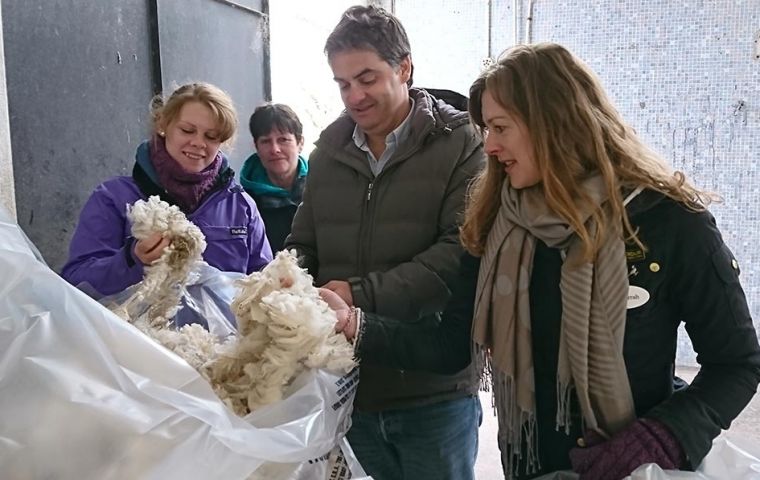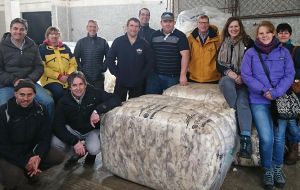MercoPress. South Atlantic News Agency
Falklands farmers in Uruguay
 Examining wool at SUL - the Uruguayan Secretariat Wool research facility (Pic. F Peck)
Examining wool at SUL - the Uruguayan Secretariat Wool research facility (Pic. F Peck)  The delegation visiting “La Mariscala” farm property of Rafael Gallinal
The delegation visiting “La Mariscala” farm property of Rafael Gallinal  The delegation at Uruguayan Secretariat Wool research facility
The delegation at Uruguayan Secretariat Wool research facilityA FALKLANDS delegation is currently visiting farms in Uruguay. Penguin News asked the group if they would provide an insight into their experience so far.
Agricultural links between the Falkland Islands and Uruguay are being strengthened this week with a delegation of farmers, wool industry representatives, and the Department of Agriculture (DoA) commencing a tour of farms, wool processors and research facilities. Outgoing Senior Agriculture Advisor Adam Dawes said: “Even though the production systems are different, many common challenges are faced by the wool industry in both countries.
“Both countries rely on native pasture stands and use grazing management to get the best production from the land. Both governments have cost pressures in their department and collaboration on common issues such as animal welfare which would benefit farmers in both countries.”
The group visited among others Raphael Gallinal’s farm ‘La Mariscala’, a leading Uruguayan farmer who selected a native lotus over 20 years ago, and through selection and extension this legume has become a major reason for the improvement of the quality of native Uruguayan camps.
While there Lee Molkenbuhr commented that he valued being on a farm where the farmer was focused on the commercial side of the business, and had achieved great genetic gains in his Corriedale sheep flock and was turning out steers weighing 550kg on the hook at 35 months of age.
The delegation visited the Uruguayan Secretariat Wool (SUL) research facility, where they were hosted by Ignacio Abella, who outlined to the delegation their current research, how it is funded, and hosted a tour of their lab, sheep, pastures and wool shed.
Dae Peck particularly enjoyed seeing the lab and the laser scanner in action. She said it would help her management back on the farm in the Falklands, giving her confidence and a greater understanding of the data she receives from the New Zealand Wool testing service who laser scan their flock.
Ignacio’s take-home message was that good long-term grazing in Uruguay combines cattle and sheep in the same camp to utilize the different types of grasses and keep the pastures productive.
Donna Minnell said that the shelters built to house ewes with lambs to protect them from the weather was very interesting, but wondered if the Falklands would be too windy for this technology.
Farrah Peck from WoolCo saw synergies between the SUL research into ethical farming in terms of animal care and consideration of sustainable grazing, and these good practices implemented by farmers can then be used in credential and accreditation schemes such as the Responsible Wool Standard.
The tour was then hosted by Pedro Otegui of Lanas Trinidad, a wool processor who purchases a substantial amount of the Falkland Island wool clip.
Pedro, the Director of the company, said the relationship between the Falkland wool growing community and Lanas Trinidad was very important, and just the beginning of greater things to come.
The delegation saw how the company transforms greasy Falkland Islands wool into high quality top ready to be exported to spinners, weavers and then garment makers.
Reba Peck said she had, “enjoyed seeing the process from greasy wool to beautiful tops. It was very interesting seeing how the machinery works, a process I’ve wanted to learn about for several years, since I have been working as a wool handler.”
The company also has an emphasis on ethical and efficient practice running on 100% renewable energy, which includes methane collected from their waste scouring water, wood grown from their recycled and reclaimed water, good conditions for their employees, and quality assurance that ensures the end user receives the high quality wool they require.
Tom McIntosh, the incoming Senior Agriculture Advisor, said it was important to have processors who are working to maintain the market share of wool against other fibers, such as cotton and synthetics, by guaranteeing the quality of the wool and good relationships with the producers, wool companies and buyers for the tops produced.
Keith Knight said, from both a farmer and director of WoolCo perspective, Falkland growers welcome feedback in terms of wool preparation to ensure our genetic programmes and stock management is producing the fibre that is in demand, and returns the best price to the Falkland Islands farmer.
The farm and research facility tours continue through to the end of this week, with the delegation then attending the Expo Prado 2019 in Montevideo next week.
By Farrah Peck - Penguin News




Top Comments
Disclaimer & comment rules-

-

-

Read all commentsArgentina will decolonize Patagonia within 25 years
Sep 07th, 2019 - 08:00 am +3Deadly Dave
Sep 07th, 2019 - 07:52 pm +1How you wish upon a star, losers never get to rewrite history.
If wishes were horses beggars would ride.
England will return the Malvinas within 25 years.
Sep 12th, 2019 - 01:36 am 0Commenting for this story is now closed.
If you have a Facebook account, become a fan and comment on our Facebook Page!